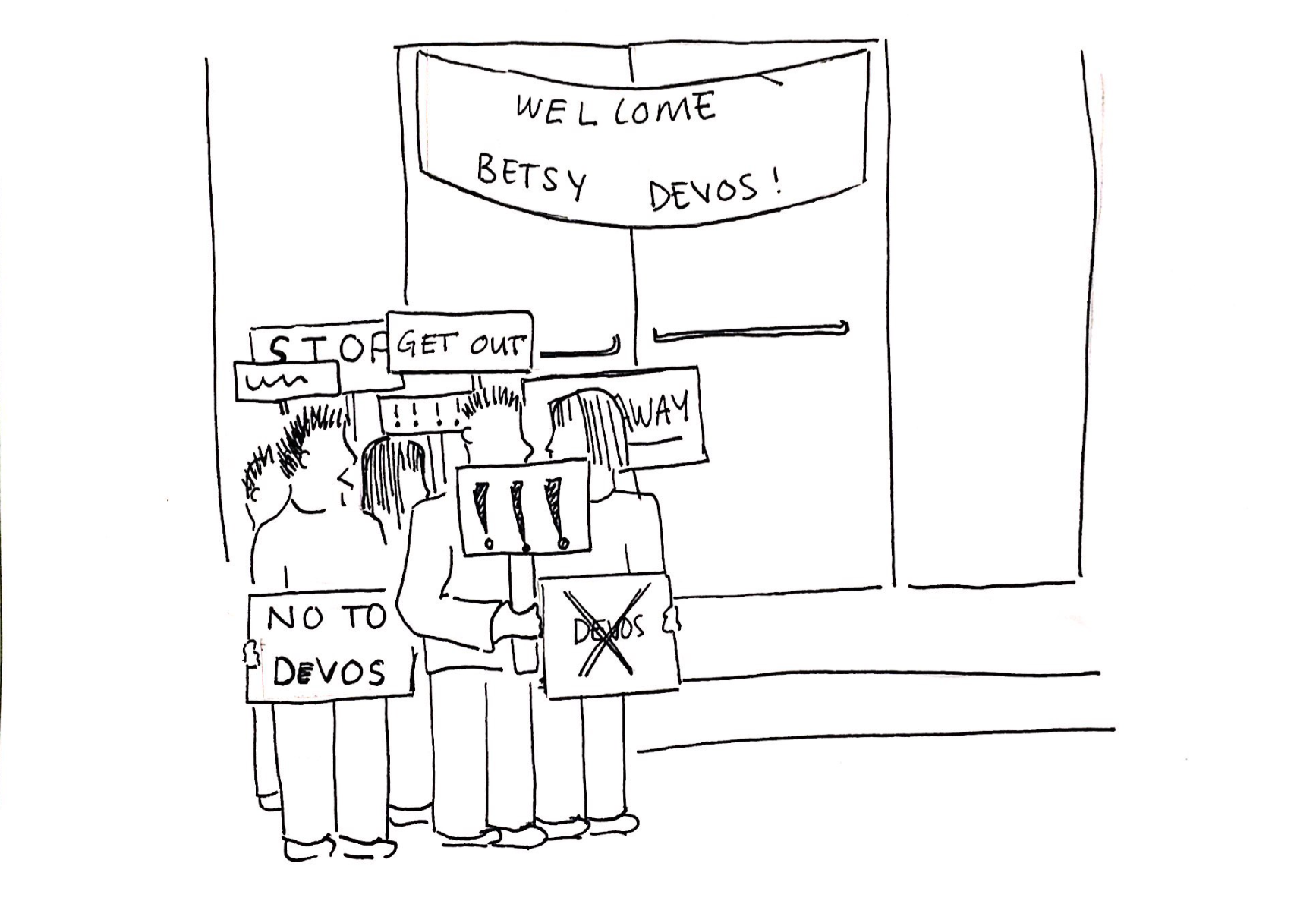At least 17 states have proposed or approved legislation designed to prevent students from speaking out against controversial speakers on their campuses. But these proposals masquerade as a way to block students from exercising their right to protest.
Students protesting against controversial speakers has been a nationwide occurrence, from students at the University of California, Berkeley opposing a visit from conservative commentator Milo Yiannopoulos to students shouting down a lecture by author Charles Murray at Middlebury College. Although lawmakers see student protests as a negative reflection of a university, there is nothing wrong with standing up against controversial figures. Protests have led to meaningful conversations about politics and values between students of different beliefs.
Legislation currently being considered by Wisconsin lawmakers is extreme because the bill would require universities to suspend or expel students who prevent the speech of other individuals. Introducing legislation to prevent controversial voices from being drowned out does not protect free speech – it does the opposite. Lawmakers should not infringe upon students’ First Amendment rights and should allow students to speak out about the people and issues they oppose.
Students have used their right to protest speakers to spark conversations about issues relating to the controversial figures. Students protested Education Secretary Betsy DeVos in 2017, prompting conversations about her Title IX policies and allowing survivors and their allies to speak out. The University has also asked Brazilian politician Jair Bolsonaro to visit campus, but students protested and created a conversation about the legitimacy of right-wing rhetoric from a foreign politician. In 2012, students protested the appearance of Phyllis Schlafly – a conservative politician who supported antifeminism – starting discussions about the role of feminism and female empowerment.

Tara Peckham | Cartoonist
Passing legislation that would block students’ ability to protest controversial speakers like DeVos and Bolsonaro would prevent dialogue about issues – like sexual assault and hate speech – from developing on campuses. Universities should feel comfortable bringing in dicey speakers knowing that students may revolt. Suspending students who voice their opinions violates their right to free speech and supports the speech of individuals whose beliefs sometimes hurt student groups.
The language of Wisconsin’s proposed law is vague, giving universities and lawmakers a loose mandate to decide when suspension or expulsion is necessary. The legislation states that Wisconsin schools suspend students who “interfere with the expressive rights of others” more than once and requires public universities in the state not to take positions on public policy matters. States that adopt this law need to be clear on who is making the decision behind suspensions and on what grounds they are basing these suspensions. Students who incite violence should be suspended, but students who speak out against a speaker or interrupt an event should not be punished for exercising their rights.
Students’ rights to protest should extend as far as students want, so long as they do not incite violence or use hate speech, like when students at UC, Berkeley protested Milo Yiannopoulos and caused $100,000 worth of damage to campus. Last year, GW’s Young America’s Foundation hosted conservative commentator Ben Shapiro. Students posted flyers threatening the event and suggesting that YAF hire security. Universities should be willing to intervene when student protests get violent or break laws, but they should not limit the speech of students who are peacefully protesting.
Universities should not be discouraged from bringing controversial speakers to campus for fear of student backlash. The University’s role is to provide education and share ideas – even from those with whom we disagree. But students should not be expected to blindly listen to people they oppose without speaking up. Just as the speaker has the right to espouse controversial opinions, students have the right to speak against them.
This law tells students that their voices do not matter and sets a dangerous precedent that one person’s speech is more valuable than another’s. Lawmakers are signaling that people in power are more important than students’ voices and ideas. The law seems to protect the image of a university and ensure that students will not appear to embarrass a school when a high-profile speaker visits. It is in a school’s self-interest to prevent situations that might reflect poorly on it, but taking away freedom of speech to do this is an overreach.
This law places all power in the hands of administrators and powerful speakers. It is unacceptable in any circumstance to violate the First Amendment to freedom of speech and assembly – even if students disagree with what is being said.
The editorial board is composed of Hatchet staff members and operates separately from the newsroom. This week’s piece was written by opinions editor Kiran Hoeffner-Shah and contributing opinions editor Hannah Thacker based on conversations with The Hatchet’s editorial board, which is composed of assistant copy editor Natalie Prieb, managing director Leah Potter, contributing design editor Olivia Columbus, sports editor Emily Maise and culture editor Sidney Lee.


